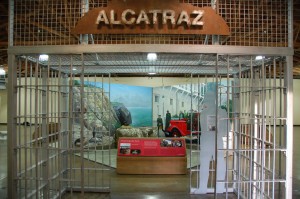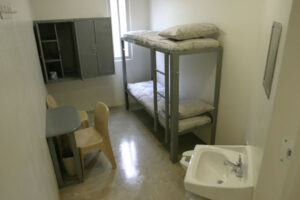 “When you’re a houseguest in hell, you learn the devil has many mansions and you keep shuttling between them for no know reason.” Leonard Peltier, Prison Writings
“When you’re a houseguest in hell, you learn the devil has many mansions and you keep shuttling between them for no know reason.” Leonard Peltier, Prison Writings
A recent USA Today headline touted, Prisons unlock mysteries at new tourist destinations. It went on to say how there’s new glamour in the slammer and how old prisons, from famous ones such as Alcatraz to lesser known state facilities are becoming tourist attractions and drawing a growing numbers of visitors. The prisons trade on formerly famous guests, such as the notorious Al Capone, who was at the aforementioned Alcatraz and Sonny Liston, who learned to box while incarcerated at the Missouri State Penitentiary. Day and evening tours, cell visits and prison chow hall dining are being offered to guests and some penitentiaries are drawing 250,000 visitors a year.
Quite a morbid fascination, but in America that’s come to be the norm. With society accepting the criminal underworld as pop culture, numerous outlaw empires such as the Italian Mafia, the Colombian cocaine cartels and the Bloods and Crips have become mythical icons in Hollywood lore. Why not take it one step further and make old, closed down prison tourist sites? Anything for a dollar right? History buffs, ghost hunters, wanna be G-men, prison groupies and curious people fascinated by convict life represent the expanding number of visitors who are touring prisons like they once went to Disneyland. Only in America could the punishment of man become a spectacle that befits a tourist attraction. But as we have become the world’s leading incarcerator, a nation obsessed with life in the belly of the beast has emerged.
As a veteran of 19 straight years in the federal Bureau of Prisons I would like to offer up to readers my own tour of the BOP. But take my advice, you would much rather read about it than have to live it. That is why I am here, so you can experience my life one column at a time, kind of how gangsta rap took suburbanites into the inner-city gutters for three minutes a song. NWA told listeners that, “You are now about to witness the strength of street knowledge,” and I am doing the same thing. Welcome to my world, life in the netherworld of corruption and violence. So strap up, tie your boot laces tight and don’t forget your shank, because I am going to take you on the Gorilla Convict BOP tour.
 I came in at age 22, one hundred sixty five pounds soaking wet. This was in 1993 before the “No Frills Prison Act,” so my first stop, FCI Manchester in Kentucky, a brand new prison built courtesy of the “War on Drugs,” still had weights and other amenities that would shortly be banned in federal prisons across the nation. Manchester had a nice college like campus. The landscape was dotted with manicured lawns and freshly paved sidewalks, four state of the art housing units and a mini-amphitheater was in the middle of the compound, right outside the chow hall. I was young and naive to prison, it was culture shock to me for real, but I was fresh in on a 25 year sentence and knew I needed to get my respect by any means necessary. Because in the feds, as they call the federal prison system, “If it ain’t rough, it ain’t right.” Or at least that is what they say.
I came in at age 22, one hundred sixty five pounds soaking wet. This was in 1993 before the “No Frills Prison Act,” so my first stop, FCI Manchester in Kentucky, a brand new prison built courtesy of the “War on Drugs,” still had weights and other amenities that would shortly be banned in federal prisons across the nation. Manchester had a nice college like campus. The landscape was dotted with manicured lawns and freshly paved sidewalks, four state of the art housing units and a mini-amphitheater was in the middle of the compound, right outside the chow hall. I was young and naive to prison, it was culture shock to me for real, but I was fresh in on a 25 year sentence and knew I needed to get my respect by any means necessary. Because in the feds, as they call the federal prison system, “If it ain’t rough, it ain’t right.” Or at least that is what they say.
Back then, since the system was not yet bloated due to the governments “War on Drugs”, only 40,000 or so prisoners were in the feds. The compound at Manchester had about 800 prisoners- mostly crack dealers, felons in possession of a gun offense, bank robbers, gangbangers, Mafia members, outlaw bikers and the new fresh wave of LSD offenders like me. When a lot of the older convicts from the 1980s, who were most definitely hardened criminals, met me, they couldn’t believe a young, all American, college looking kid was in prison with a 25 year sentence. I got a lot of comments like,” So how many people did you kill?” But the answer was always the same, “None.”
In 1996 I was transferred to FCI Beckley in West Virginia, another brand new prison built courtesy of the “War on Drugs” and the Clinton administration. I didn’t want the transfer, I was comfortable and settled in at Manchester, but in the BOP they just move you whenever and however they want. You have no choice in the matter. They tell you to pack it up and you’re gone. At the mercy of an inefficient bureaucracy that has not rhyme of reason to anything they do.
Beckley was very similar to Manchester, except it was bigger and housed more prisoners. The system was starting to expand and I was witnessing it firsthand. I saw wave after wave of new prisoners rolling in, as our government kept putting new laws on the books to give different segments of society federal sentences. First it was the crack dealers, then the LSD and marijuana dealers, then the methamphetamine dealers, then all the illegal immigrants, then the white collar crime dudes. It was like every two years a new wave of prisoners with the same type of crimes entered the BOP. The feds were equal opportunity incarcerators. The prison industry was booming growing at a rapid rate.
All the guards like at Manchester, were locals from a depressed economy. They jumped at the chance to get a government job with benefits. Except they weren’t called guards, they were called correctional officers, but they weren’t correcting anything. It was just the 1990s political correctness double speak reminiscent of George Orwell’s 1984. I didn’t know it at the time but I had entered an alternative sub-culture that was taking on a life of its own and becoming a major economic player in our country. Incarceration was becoming a business and business was good.
We didn’t have cells though, at least not how you would think of them from watching movies. Both Manchester and Beckley had two man rooms with a bunk bed on one wall, a toilet, sink and mirror, two metal lockers on the wall to store our stuff and a small metal desk. It wasn’t nice, but it wasn’t like the cells with bars on them that you see in “Oz” or “Shawshank Redemption” either. But the prisons were violent, it’s not like dudes were getting shanked to death, stabbed 50 times or raped daily, but dudes were getting beat down, cut and fucked up every day with a variety of weapons from a mop ringer to a lock on a belt to tuna cans in a sock to razors embedded in a toothbrush. There was a reason they called the FCI’s “gladiator schools.” Still you have to realize what they show in movies and on TV about prison are the extremes; extremes do happen but not every day.
 In 1999 my level dropped from medium-high to low and I got to put in a transfer request. Normally transfer requests don’t hold any weight, the BOP sends you where they want, when they want, but I got lucky and was sent to FCI Fort Dix in New Jersey, a sprawling federal prison with over 5000 prisoners on two compounds that was situated on a military base. To me Fort Dix was great. They had 12 man rooms and a spacious compound with open moves, meaning you could move around the prison freely. Manchester and Beckley were more restrictive, only having one ten minute move every hour. That meant if you wanted to go to recreation, the law library, commissary, the chapel or back to the unit you could only go when the move was called. The rest of the time the compound was secure and after the nightly recall at 8:30 p.m. you weren’t going anywhere. Fort Dix was different; it was open all day until yard recall.
In 1999 my level dropped from medium-high to low and I got to put in a transfer request. Normally transfer requests don’t hold any weight, the BOP sends you where they want, when they want, but I got lucky and was sent to FCI Fort Dix in New Jersey, a sprawling federal prison with over 5000 prisoners on two compounds that was situated on a military base. To me Fort Dix was great. They had 12 man rooms and a spacious compound with open moves, meaning you could move around the prison freely. Manchester and Beckley were more restrictive, only having one ten minute move every hour. That meant if you wanted to go to recreation, the law library, commissary, the chapel or back to the unit you could only go when the move was called. The rest of the time the compound was secure and after the nightly recall at 8:30 p.m. you weren’t going anywhere. Fort Dix was different; it was open all day until yard recall.
The housing units were converted military barracks that were dirty, old, crumbling and dilapidated, but we weren’t locked in cells at night and there was just a general atmosphere of more freedom. Plus Fort Dix was basically an immigration center at the time. There were over 75 nationalities represented on the compound and soccer was the biggest sport on the compound. Quite a change from what I was used to, usually in prison basketball, softball and football were the norm. Untypically of an American, I love soccer. I was always a big soccer player. I grew up in California playing and when I was at Manchester and Beckley, all the Jamaicans and Colombians told me that Fort Dix was the soccer Mecca of the BOP. So in essence I transferred to Fort Dix to play soccer, because for me it represented the only place where I could test myself against players of the highest skill level. I was 28 years old, 185 pounds and in my athletic prime. I wanted to challenge myself, in my preferred sport, against the best competition that was available and I did at Fort Dix.
Sadly, at the beginning of 2002, I was transferred back to a medium-high security prison in New Jersey- FCI Fairton. This was a very high profile East Coast facility that housed a bunch of noteworthy mobsters, gangsters and infamous Puerto Rican and black drug dealers. It was the first prison I was at where there were a bunch of dudes doing life and the majority of men there had been down multiple decades. Interestingly enough I was transferred for an article I wrote for Don Diva magazine that represented the start of my journalism and writing career. After 9-11 the warden at Fort Dix decided that the article that Don Diva published depicted images that were a threat to incite a riot, so I was transferred to Fairton. https://gorillaconvict.com/pdf/white%20boyz%20article.pdf
FCI Fairton was built in 1990 and had the same layout as Manchester, except due to the prison overcrowding, they had started triple bunking. My arrival there was unpleasant. The compound and prisoners weren’t the problem. The problems I experienced were due to the administration, which had put a target on my back due to my writing. I experienced more trips to the hole, shakedowns and harassment there, than I had ever experienced before. All due to me trying to write for publication. To me Fairton was a hell hole, but that was only because they were writing me fictitious shots, throwing me in the hole for no apparent and random reasons and trying to break me. All because they didn’t want me to write about my prison experiences. It was very unpleasant but I met some good men and got some good stories. And like they say the pen is mightier than the sword, so I kept writing, despite the BOP’s opposition.
 In 2004 I was transferred to FCI Gilmer, back to West Virginia. FCI Gilmer was another brand new prison, built to give the local community an economic boost. By this time I was a seasoned BOP veteran and Gilmer made the third joint I had opened. I figured the BOP was using me as a designated facility opener, I guess I had found my calling in life. Yeah right. But for real by the time I left Fairton I didn’t really want to leave, but I had no choice in the matter, they needed me for a population increase move, and I was off again.
In 2004 I was transferred to FCI Gilmer, back to West Virginia. FCI Gilmer was another brand new prison, built to give the local community an economic boost. By this time I was a seasoned BOP veteran and Gilmer made the third joint I had opened. I figured the BOP was using me as a designated facility opener, I guess I had found my calling in life. Yeah right. But for real by the time I left Fairton I didn’t really want to leave, but I had no choice in the matter, they needed me for a population increase move, and I was off again.
Gilmer was built the same way as Beckley, it was identical. Three big units broken into four separate housing pods, with about 150 prisoners in each pod in two man cells. There were no TV rooms; all the TVs were posted up on poles in the common area, which had a drab concrete floor instead of tile or carpet. I noticed that as the federal prison system expanded, and they built more and more new prisons all the little architectural and stylistic flourishes were cut out. I guess it was more cost effective. But Gilmer was all right. With my future in mind I made a conscious decision to stay out of the mix, leave the prison politics alone and live drama free.
Gilmer was violent, but by this time I was accustomed to the violence, even desensitized to it, and it wasn’t overwhelmingly violent, just regular in prison terms. They fucked with me for my writing a little, but then basically left me alone. I just continued doing what I do- working out, playing sports, taking college correspondence courses and working on my writings. My first book “Prison Stories” came out when I was at Gilmer and I met a lot of good dudes I would go on to write stories about. We got locked down all the time at Gilmer, but that was due to the gangs and all the fights. For the most part I avoided the drama, and focused on building a career in journalism.
In 2006 my level dropped again to low security and I was transferred to FCI Loretto in Pennsylvania. Loretto was a different type of prison for me. It was a converted seminary, kind of like Fort Dix in the sense that it wasn’t built to be a prison, but converted for that effect. Loretto was all inside, hallways and hallways of rooms all connected. They had ten minute moves, but the way the prison was laid out all the units were connected in some form or fashion. I was put in a six man room that was really meant to be a four man room. Loretto had been open since the late 80s and was originally intended to hold 800 prisoners; by the time I got there in 2006 it held 1600.
It was extremely overcrowded. We were packed in there like sardines. When you stood up in your six man room for count you barely had enough room to stand. There was no air or heat, just like in Fort Dix and everything was broken down, old, crumbling and dilapidated, but the prison was actually ok despite the crowding. The newer prisons I had been at Manchester, Beckley and Gilmer had central air conditioning, heat and better facilities but the older prisons like Fort Dix and Loretto had more programs, more things in place to keep prisoners occupied.
At a low security facility it wasn’t half as violent as the mediums. Stuff still happened but the frequency was very rare. Like in a USP or high security prison violence happens 85% of the time, in a medium 50% of the time and at a low about 15% of the time. The lower the level of the prison the less violence is pretty much how it goes. At Loretto the staff was real laid back also, almost to the point that they didn’t really give a fuck. They just wanted to make sure you were where you were supposed to be for the counts. Other than that, sometimes you didn’t even see any guards as you walked through the hallways. I stayed at Loretto four years, longer than I had any other prison. Not that I wanted to stay, I was hoping to go to a minimum security camp, but halfway through my time there I got a shot for inciting a riot. Let me explain.
I sing and play guitar. At most prisons they have some sort of band program in recreation. They have band rooms to practice in and PA’s, guitars, drums, bass and amps. I would always hold down a band slot and whenever I could find the people to play with, which wasn’t always possible, I would front a punk rock/metal/alternative band. http://www.myspace.com/felonsrage#! Periodically, usually on holidays, the recreation department would have band shows. On Thanksgiving in 2008 I had a slot to play in the show.
I was tuning up the guitar and checking the microphones, getting ready to play a show for the prisoner population. My set list that was comprised of originals I had penned and covers like the Pixies “Where is my Mind”, Smashing Pumpkins “Today”, Tools “Sober” and Alice in Chains “Man in the Box”. We also had a special song planned, NWA’s “Fuck the Police” which we had sped up and made into a punk rock song. The recreation staff had warned us not to play the NWA song but I was like fuck it. The recreation cop was scared to let us play the song so he gave me the throat gesture sign, warning me not to play it. The crowd of prisoners, several hundred of them, were expecting me to play the song and cheering for me, asking me to play “Fuck the Police”. I relented though and told the crowd, “They won’t let us play it. Censorship, discrimination.” For this I was quickly locked up, written a shot for inciting a riot and held in the hole for 4 months. That blew my chances to go to a camp. So I stayed in Loretto for two more years.
 Finally in 2010, I was transferred again. I was getting short, well short for me. I had just gone under 60 months left on my sentence. My wife lived in Saint Louis, Missouri and had been traveling to the East Coast to see me every three months or so. I decided to get my probation changed to her residence in Saint Louis as I would be released there in 2015. My case manager at Loretto did the paperwork on the probation relocation package, got it approved and I was designated for a transfer to FCC Forrest City, Arkansas, which would allow me to get a visit every month since it was only five hours away from Saint Louis. As I made my journey to Forrest City I knew it would be my last time in transit. I would be going home from Forrest City, which would be the last prison in my BOP tour.
Finally in 2010, I was transferred again. I was getting short, well short for me. I had just gone under 60 months left on my sentence. My wife lived in Saint Louis, Missouri and had been traveling to the East Coast to see me every three months or so. I decided to get my probation changed to her residence in Saint Louis as I would be released there in 2015. My case manager at Loretto did the paperwork on the probation relocation package, got it approved and I was designated for a transfer to FCC Forrest City, Arkansas, which would allow me to get a visit every month since it was only five hours away from Saint Louis. As I made my journey to Forrest City I knew it would be my last time in transit. I would be going home from Forrest City, which would be the last prison in my BOP tour.
Forrest City makes the seventh federal institution that I have resided in. It’s ok here; basically it is the same layout as both Beckley and Gilmer. It amazes me how all these prisons that were built in the 1990s and 2000s are exactly the same. It’s like they got a blueprint and just ran with it, same contractors and everything, who knows. The compound here is big, there are 2000 prisoners here. It is a low like Loretto, so that makes three low security and four medium-high security prisons I have been at during my journey and tour of the BOP. One highlight of being here was that I got to meet T.I. I was hoping he would endorse my books and website and shout me out on twitter, we talked about it, but now he is gone and I have never heard from him.
I am finishing up my sentence finally and as I look around the people in prison seem very different to me. Around 2008 they started locking up pedophiles in the feds and FCC Forrest City is filled with them. They aren’t even real criminals in my eyes. I believe they are sick or demented or whatever, most of them are here for looking at kiddie porn on the internet. Not my cup of tea and it’s a long way from when I first came in and was around what I considered real hardened criminals.
Even the drug dealers and gangbangers seem different. When I first came in everybody seemed like go hard convicts, now it’s just a bunch of kids. Some of these dudes never even flipped 10 grand, what kind of drug dealer is that? It just seems like a whole bunch of people that shouldn’t be in prison are here. That just goes to show you how the feds will lock up anyone nowadays, regardless of if they are real criminals or not. This whole system has turned into an enterprise. I don’t know, maybe it is me. After being in so long I guess I am sort of desensitized and jaded to everything around me. I hope not.
That concludes the Gorilla Convict tour of the BOP. I hope you enjoyed it. I can’t say that I have, but I have done the best I can to prepare myself for my eventual release and I have tried to connect with as many people in the world as I can through my writing. I will continue to do my thing and I hope you all continue to enjoy reading what I have written. I have learned a lot in my journey through the American criminal justice machinery and industrial prison complex but now I am ready for my tour to be concluded. I am ready for the world and what it has to offer. Thanks for reading and thank you for taking the Gorilla Convict BOP tour.



2 Comments
I have been to one med fci Memphis and lorretto and fix dix for drug program on west sideof course didnt get time off or half way house due to state charge in ohio I think we where there around same time
I worked in safety at ft.dix for mr g himg with big Indian chief walt d real name I thought was laid back place